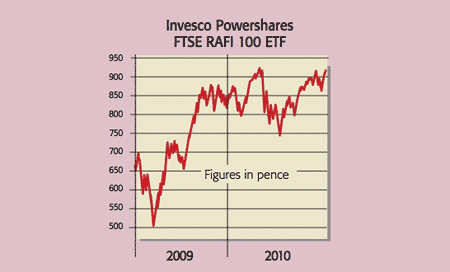
If you look at the assets invested in associated exchange-traded funds (ETFs), then the three most popular share indices for European investors are the Euro Stoxx 50, the MSCI Emerging Markets, and Germany’s DAX index. The S&P 500 and FTSE 100 come fourth and fifth. What do they have in common? They’re all capitalisation-weighted – the weighting of an individual stock in the index reflects the company’s valuation (market capitalisation).
But not everyone is happy with the idea of tracking such indices. Indeed, the French business school EDHEC-Risk has found that two-thirds of Europe’s large institutional funds view cap-weighting as flawed, because you end up buying stocks when they are most popular, rather than when they are cheap.
For example, during the 1999/2000 internet bubble, tech stocks soared to represent more than a third of the S&P 500. At the height of Japan’s bubble in 1989, Japanese stocks made up more than half of a global equity index. So if you’d bought a cap-weighted index fund then, you’d be exposing yourself to an overvalued sector at just the wrong time.
There are other ways to index. Of these, only ‘fundamentally’ weighted portfolios are currently available to UK investors as ETFs, via the Invesco Powershares range. How does this work? Take the iShares FTSE 100 ETF (LSE: ISF) and the Invesco Powershares FTSE RAFI 100 ETF (LSE: PSRU). You’ll notice some differences in sector allocations. The FTSE RAFI 100 allocates more to telecoms and financials than the cap-weighted FTSE 100, but less to basic materials and healthcare. Compared with the cap-weighted FTSE 100, Vodafone’s weighting in the RAFI index jumps from 5.75% to 8.5%, while Rio Tinto’s falls from 4.5% to 3.2%.
RAFI’s methodology uses four measures – companies’ cash flow, dividends, sales and book value – to determine stocks’ weights in the index. The resulting differences may sound tiny. But RAFI says its index version beats cap-weighted rivals by more than 2% a year in most markets, over the long term. That makes a huge difference to returns potentially. It doesn’t always work in individual years. RAFI’s index underperformed the FTSE 100 in 2008 and has done again so far this year. But given our bent towards value investing, we’d certainly say it’s worth looking at alternatives to cap-weighting for any market you’re buying.
• Paul Amery edits
www.indexuniverse.eu